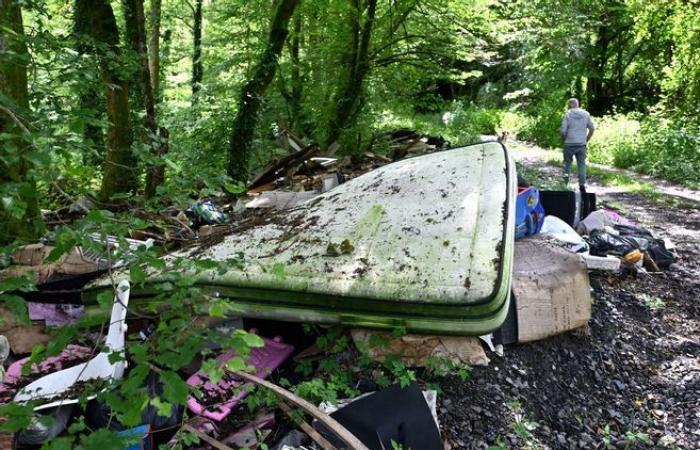In Haute-Vienne, agents of the French Office for Biodiversity (OFB) and the gendarmes are increasingly reporting environmental offenses, resulting in serious damage or risk to the environment. To fight against the latter, the Haute-Vienne gendarmerie has had forty specially trained soldiers since November 2023. For its part, the OFB is increasing its controls.
Between 2016 and 2021, the number of environmental offenses
, like illegal dumping, increased by 7% in France, according to the first inventory published in May 2022 by the Ministry of the Interior. Since then, the fight against environmental offenses has become a real national issue.
There has been a particularly strong increase in offenses linked to pollution (+96%, or 14% on average per year) and waste (+63%, or 10% on average per year). Between January and April 2024, law enforcement recorded 15,469 offenses related to waste in the country.
Increasing incivility
In Haute-Vienne, the police component linked to environmental offenses of the French Biodiversity Office (OFB) represents more than half of the officers’ missions. “We intervene as administrative police when a prefectural order is not respected, or in a judicial framework under the authority of the public prosecutor,” explains Philippe Goursaud, director of the OFB of Haute-Vienne.
This police force is normally mobilized to “defend and protect the living”. But for several years, it has been confronted with an increase in these “environmental incivilities”.
“Open landfills”
“Faced with dysfunctions in waste management, people dispose of them inappropriately, in a natural environment. » From paper to vehicle wrecks, including cigarette butts, municipalities are facing real “open-air dumps” with, sometimes, “very large” volumes: “Waste calls for waste”.
Garbage and bulky items: incivility and illegal dumping in the sights of Limoges Métropole
The environmental impact is “very significant”, because the environments are polluted and the balance of ecosystems is disrupted. “We are talking about diffuse pollution,” assures Philippe Goursaud. These numerous incivilities have varied origins “depending on the context and areas in the department”.
In small towns, users store “tires, vehicle wrecks, or even scrap metal contaminated with asbestos. People prefer to store rather than have them disposed of by specialized companies, because it costs too much.” Others continue to burn their green (**), “even household” waste. This creates “conflicts on a local scale and pollution”, reveals the director of the OFB.
Birds mutilated by strings
Another local problem is agricultural waste. “In the fields, we find pieces of plastic, particularly silage tarpaulins,” denounces Philippe Goursaud. However, a sector exists, and every year an annual collection is offered to cooperatives, with “lower costs”, according to the director.
Waste collection in Haute-Vienne: the bill soars
In addition to plastics, strings are a real scourge for wildlife. Still according to the director of the OFB,
“the birds use it to make their nest and the strings are wrapped around the legs of the chicks… and form a tourniquet. We end up with mutilated birds that lose limbs and die.” empty
(empty)
If individuals are significant producers of waste, businesses can also be sources of pollution. “As for businesses in Haute-Vienne, the events are minor. Within large structures like Orano and Sylvamo in Saillat, safety rules are scrupulously respected. At Orano, there is a real environmental approach that is carried out. On the other hand, there is a scam in the subcontracting of waste treatment. Regularly, companies charge for the service even though the elimination was carried out in a brutal manner,” confesses Philippe Goursaud.
In-depth investigations
To put an end to all these incivilities, the OFB works hand in hand with the regional directorate for the environment, planning and housing (Dreal), the Public Prosecutor’s Office, but also the gendarmerie. Following the creation, on July 1, 2023, of the Command for the Environment and Health (Cesan), the Haute-Vienne gendarmerie group has in its ranks gendarmes specializing in environmental matters.
Wild dumping of household waste: the town of Nantiat says stop
This service, dedicated to combating attacks on the environment and public health, has enabled the training of more than 4,000 gendarmes within the groups, companies and brigades of each department. “The objective being to train forty gendarmes, distributed within each brigade of the department. » Elected officials now have a privileged contact within the gendarmerie and know who to turn to in the event of a problem. “60% of them want to fight against illegal dumping,” indicates Major Massoteau, commander of the Solignac brigade and Cesan referent.
An expectation on the part of citizens
When a report is made, the gendarmes, now trained, investigate in order to find the owners, perpetrators of the offenses.
“We are receiving more and more reports. There is a real expectation on the part of citizens. They want this type of offense to be punished. And at the level of the Prosecutor’s Office, the quantum of punishment is evolving,” notes Major Massoteau. empty
(empty)
In addition to illegal dumping, the gendarmes are required to carry out investigations into pollution, the use of phytosanitary products, the trafficking of exotic animals, animal mistreatment, but also fires. “30% of our annual interventions depend on the Environment and Public Health Code, but only 1% give rise to a sanction. When we know that in total, we can identify more than 4,000 infractions…” reveals the major.
Oil pollution in Limoges, cubic meters of oil spilled into the Aurence river (February 2024)
To do this, level 1 investigators have a new application called EnviroGend set up by the Multimedia Production Center of the National Gendarmerie (CPMGN) based in Limoges. “If we practice tolerance on certain subjects, we are mainly in a process of education and awareness before repression. We carry out eco-citizen training courses, particularly when people are punished by law. Punitive ecology has its limits, but we must maintain this pressure and occupy the ground to identify these offenses with all partners such as the Dreal, the gendarmerie and the Public Prosecutor’s Office. »
Environmental offense is the act which contravenes environmental legislation and results in serious damage or risk to the environment or human health.
(**) In December 2020, the Government created a 4th class fine penalizing the elimination of bio-waste by burning in the open air introduced by article 88 of the law relating to the fight against waste and circular economy.






